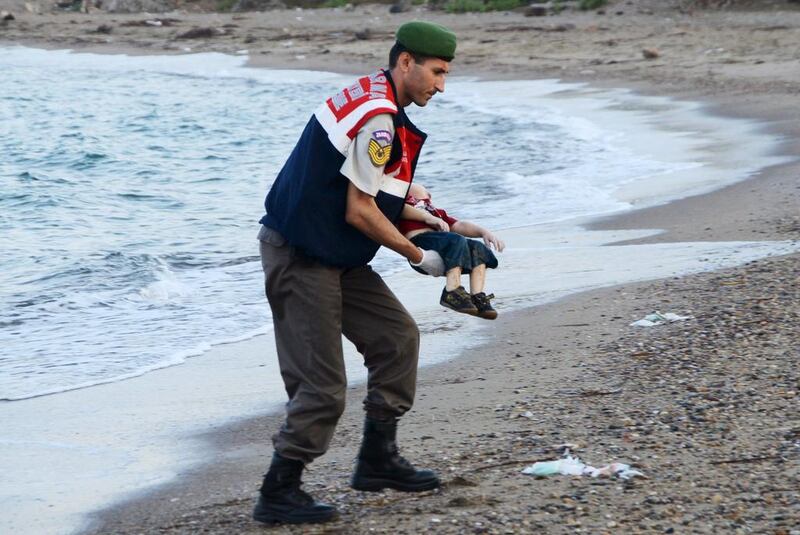The shocking picture of a small Syrian boy lying face down in the sand on a Turkish beach fuelled debates over the intensifying refugee crisis. Other hot topics of discussion included the discovery of the “largest” gasfield in Egypt, the rubbish crisis in Lebanon, sectarianism and the new Google logo.
The bigger picture
A picture may be worth a thousand words, but the image of the Syrian boy lying dead on the beach did more than that – it left everone who saw it in tears. This boy was among the 12 Syrian refugees who drowned off Turkey while trying to reach Greece.
“Take a picture of your children and tell the world that they are going to school, while Syrian children are drowning,” wrote the grief-stricken @royamahfoodh.
The deep pain was felt in the tweet of @N6_T5_S7_N10: “Oh beach, don’t cry and make us cry. Your tears hurt us. Our home is hidden in the waves, because there is no home to take us.”
For those such as alsnon14, the image is a reminder that the “destiny of the Syrian people sank long before the child drowned”. For the likes of @yesiam1a and @anwar_alrasheed, the image portrayed the helplessness of Arabs, while @BOnamana_92 saw the boy as a “victim of madness”.
Unity is strength
Many also took to social media to express their rejection of sectarianism and terrorism that’s tearing the region apart. They used the Arabic hashtag for “no sectarianism, no terrorism”.
“Our religion, Islam,” wrote Dr Ali Rashed Al Noaimi (@Dralnoaimi) “as well as our humanity tell us not to support sectarianism or terrorism”. Sultan Al Ameemi (@alameemi) and Omniyat Al Hajeri (@omniyatalhajeri) echoed a similar sentiment.
The eureka effect
Italian energy company Eni last month announced a supergiant gas discovery at its Zohr Prospect, in the deep waters of Egypt. The news is indeed exciting, especially for Egyptians. And the mood was reflected in the stock market that rose by 200 points.
“There is a fight in Egypt, and that fight is all about who can please Egypt,” wrote @3litamim, while @shibani500 seized the opportunity to explains how the country beat all odds and made progress.
@alhameeri_salem was confident that this discovery is just the beginning of a new era under president Abdelfattah El Sisi.
Rubbish issue
After more than a month of rubbish piling in the streets of Beirut, the city finally broke. Organised by the #YouStink campaign and other groups on social media, thousands of protesters marched calling for a solution to the crisis. Last week, the protesters demanded the resignation of the environment minister, Mohamad Al Machnouk. Many of them took to Twitter to voice their opinion.
Bissan @Jafra_ shared a photo of a rubbish dump, comenting that such shameful images should be enough for the minister to consider stepping down. Others such as @LeNajib and @Nadia_Tabbara were equally vocal against the administration.
The image capsule
If there was something light for the tweeters to discuss, it was Google’s new logo that ditched the old serif look. Google said it was about reflecting a new reality of the company. But could it convince the masses? Perhaps, if you look at the tweets.
“Absolutely love the new Google logo. It’s simple and very googly,” wrote @Aanchal1Kapoor.
“Out with the old, in with the new Google logo,” tweeted the actor @DianaPenty.
As with most innovations, it’s not possible to please everyone.
For example, @helenajambor was not so happy, because the new logo “has a very 90s’ feel; it looks like a kindergarten logo”.
“People say don’t change, but Google changed,” wrote a rather disappointed @aliaa08.
salalawi@thenational.ae
On Twitter: @SarahKhamisUAE





